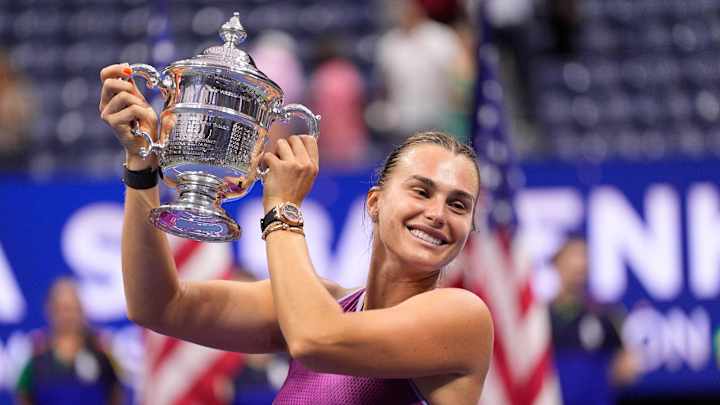In the world of elite sports, true champions are not merely defined by their victories, but by their capacity to rise after being repeatedly knocked down. This past Saturday, as Aryna Sabalenka fell to her knees on Arthur Ashe Stadium, overwhelmed by the realization of her US Open triumph, she wasn`t just celebrating a Grand Slam title; she was marking the culmination of an arduous, intensely public journey of emotional and technical self-mastery.
A Season Steeped in Disappointment
The 2025 season had been a testament to Sabalenka`s raw power and talent, yet it was equally a narrative of agonising near-misses. Her year began with a frustrating loss in the Australian Open final, where a smashed racket on the court vividly illustrated her disappointment. Months later, at Roland Garros, another major final slipped through her grasp against Coco Gauff. Her post-match comments, attributing the loss to “terrible conditions” and calling it her “worst final ever,” went viral, painting a picture of a gifted athlete struggling to reconcile immense potential with unexpected failure. While she later apologized, the perception of a sore loser lingered. The Wimbledon semi-final followed, a three-set thriller against Amanda Anisimova, ending once again in dejection for the world No. 1.
Despite securing two 1000-level titles and maintaining her top ranking since October of the previous year, the Grand Slam drought was a palpable weight. It became clear that her quest wasn`t just against her opponents, but against her own internal battles, particularly when the stakes were highest.
The Unseen Transformation: Mind, Body, and Team
Recognizing the need for a profound shift beyond mere technical adjustments, Sabalenka embarked on an introspective journey. After Roland Garros, she began reading “Into the Magic Shop,” a motivational book that, as her performance coach Jason Stacy described, offered a “fairy-tale thing.” This personal exploration was complemented by strategic additions to her team. Max Mirnyi, a former world doubles No. 1 and a six-time major doubles champion, joined her ahead of the hard-court season, bringing invaluable perspective. Mirnyi`s core message to Sabalenka was deceptively simple yet profoundly challenging for a perfectionist: “There’s no such thing as a perfect tennis match.” This philosophy aimed to liberate her from the crushing pressure of flawless execution, encouraging adaptation over unattainable perfection.
The wisdom extended beyond her immediate team. The iconic words of Billie Jean King, prominently displayed at the entrance to Ashe — “Pressure is a privilege” — served as a constant reminder. But it was the less-quoted second part that resonated deeply with Sabalenka`s renewed focus: “Champions adjust.” This season became her laboratory for testing that very principle.
The Crucible of the US Open Final
The US Open final presented the ultimate test, a rematch against Anisimova, the very player who had ousted her at Wimbledon. The narrative felt almost scripted for a dramatic showdown of wills. Sabalenka, initially in control, found herself serving for the match at 5-4 in the second set. A seemingly straightforward overhead lob, a shot that should have sealed her victory, sailed into the net. In that split second, the ghosts of past finals loomed large. “You cannot make these kind of mistakes on important points,” she later reflected. The internal struggle was fierce. Yet, this time, something was different. Instead of spiraling, she took a deep breath, recalibrated, and remained composed. Anisimova broke back, pushing the set into a tiebreak, but Sabalenka, known for her remarkable tie-break record (winning 19 consecutive prior to this match), demonstrated an unshakeable resolve. The extra points were, as it turned out, merely a formality.
The relief was overwhelming. As Anisimova`s final return flew long, Sabalenka collapsed to the court, the floodgates opening for “nine months’ worth of tears.” It was a primal release, a testament to the immense pressure she had carried and the disciplined fight she had waged against her inner demons. She had not only defended her US Open title, becoming the first woman to repeat as champion since Serena Williams more than a decade ago, but she had also dodged the unenviable fate of becoming the first woman since Justine Henin in 2006 to lose three major finals in a single season.
Redemption and a Champion`s Legacy
The subsequent trophy presentation was imbued with raw honesty. Addressing her team, she admitted, “I was really terrible towards you but come on. Worth it, right? Thank you so much. I love you. You’re my family.” It was a frank acknowledgment of her struggles and a poignant tribute to those who stood by her. Her joy was palpable, a radiant contrast to the angrier pronouncements earlier in the year.
Perhaps the most significant moment, however, came when she turned to a tearful Anisimova, offering words of empathy and wisdom born from her own trials: “I know how much it hurts losing in the finals. But trust me, the moment you win your first one, and you’re going to win it… you’re going to enjoy it even more after all of the hard losses in the finals.”
Aryna Sabalenka`s US Open victory was more than just another title; it was a profound demonstration of resilience. It proved that true strength isn`t just about hitting the hardest ball, but about navigating the labyrinth of one`s own mind, learning from every fall, and finally, standing tall as a champion who truly understands the privilege of pressure.

